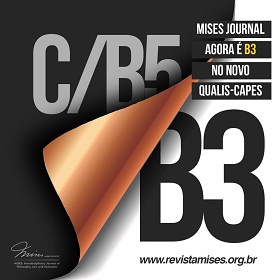Empreendedorismo
em direção ao estado de repouso Nirvana
DOI:
https://doi.org/10.30800/mises.2019.v7.1222Palavras-chave:
Empreendedorismo, Processo de Mercado, Estado de Repouso, EquilíbrioResumo
Nesse artigo, reconsideramos os diversos estados de repouso dentro da teoria austríaca do processo de mercado. Embora seja superior à teoria neoclássica do equilíbrio geral na representação dos processos de mercado, falha na produção de uma teoria holística da ação humana. A análise desconsidera as ações humanas que produzem mudanças no chamado “estado final de repouso”, que, até agora, têm sido consideradas exógenas ao processo de mercado. Dentre esses choques exógenos estão, por exemplo, a produção de conhecimento e a mudança nas preferências. Argumentamos no artigo que podem e devem ser entendidos como fenômenos de mercado, pertencendo ao escopo da análise praxiológica. Para capturar esses tipos de ação humana, propomos a introdução de um novo e, de fato, final “estado de repouso”, que chamo de “estado de repouso nirvana”. Esse novo estado de repouso representa o estado final “verdadeiro”, em que a ação humana cessa porque todas as necessidades, e, portanto, toda motivação a agir, foram totalmente dissipadas. Introduzindo esse novo estado na análise, nos libertarmos das análises míopes dos estados presentes de conhecimento e valores, e explicar as tendências gerais dos processos de mercado, preços e empreendedorismo. Mostramos também como disputas internas na EA podem ser avaliadas e resolvidas por meio dessa nova visão.
Downloads
Referências
COWEN, T.; FINK, R. Inconsistent equilibrium constructs: the evenly rotating economy of Mises and Rothbard. The American Economic Review, v. 75, n. 4, 1985.
FOSS, N. J.; KLEIN, P. G. Organizing entrepreneurial judgment: A new approach to the firm. Cambridge: Cambridge University Press, 2012. DOI: https://doi.org/10.1017/CBO9781139021173
HAYEK, F. A. The pretence of knowledge. The American Economic Review, v. 79, n. 6, 1989.
HAYEK, F. A. Competition as a discovery procedure. Quarterly Journal of Austrian Economics, v. 5, n. 3, 2002. DOI: https://doi.org/10.1007/s12113-002-1029-0
HAYWARD, M. L.; SHEPHERD, D. A.; GRIFFIN, D. A hubris theory of entrepreneurship. Management Science, v. 52, n.2, 2006. DOI: https://doi.org/10.1287/mnsc.1050.0483
HICKS, J. R. Léon Walras. Econometrica, v. 2, n. 4, 1934. DOI: https://doi.org/10.2307/1907106
HICKS, J. R. Value and Capital. Oxford: Clarendon Press, 1946.
KEALY, T. The Economic Laws of Scientific Research. New York: St Martin’s Press, 1946.
KIRZNER, I. M. Market theory and the price system. Princeton: Van Nostrand, 1963.
KIRZNER, I. M. Competition and entrepreneurship. Chicago: University of Chicago Press, 1973.
KIRZNER, I. M. Economics and error. In: SPADARO, L. M. (ed.). New directions in Austrian economics: Kansas City: Sheed Andrews and McMeel, 1978.
KIRZNER, I. M. Entrepreneurial discovery and the competitive market process: An Austrian approach. Journal of Economic Literature, v. 35, n. 1, 1967.
KIRZNER, I. M. Creativity and/or alertness: A reconsideration of the Schumpeterian entrepreneur. The Review of Austrian Economics, v. 11, n. 1, 1999.
KLEIN, P. G. The mundane economics of the Austrian school. The Quarterly Journal of Austrian Economics, v. 11, 2008. DOI: https://doi.org/10.1007/s12113-008-9045-3
KNIGHT, F. Risk, uncertainty and profit. New York: Hart, Schaffner, and Marx, 1921.
LACHMANN, L. M. From Mises to Shackle: An essay on Austrian economics and the kaleidic society. Journal of Economic Literature, v. 14, n.1, 1976.
LACHMANN, L. M. Capital, expectations, and the market process: essays on the theory of the market economy. Kansas City: Sheed Andrews and McMeel, Inc, 1977.
LACHMANN, L. M. Capital and its Structure. Kansas City: Sheed Andrews and McMeel, 1978.
LACHMANN, L. M. The market as an economic process. New York: Blackwell, 1986.
MANISH, G. Error, equilibrium, and equilibration in Austrian price theory. Quarterly Journal of Austrian Economics, v. 17, n. 2, 2014.
MCGRATH, R. G. The end of competitive advantage: How to keep your strategy moving as fast as your business. Boston: Harvard Business Press, 2003.
MISES, L. V. Profit and loss. South Holland, IL: Consumers-Producers Economic Services, 1951.
MISES, L. V. Theory and History. Auburn: Ludwig von Mises Institute, 1985.
MISES, L. V. Human action: A treatise on economics. Auburn: Ludwig von Mises Institute, 1998.
OPEN SCIENCE COLLABORATION. Estimating the reproducibility of psychological science. Science, v. 349, n. 6251, 2015. DOI: https://doi.org/10.1126/science.aac4716
ROTHBARD, M. N. The present state of Austrian economics. In: ROTHBARD, M. N. (ed.), The Logic of Action One: Method, Money, and the Austrian School. Cheltenham: Edward Elgar, 1995.
ROTHBARD, M. N. Man, Economy, and State. Auburn: Ludwig von Mises Institute, 2009.
ROTHBARD, M. N. Science, Technology, and Government. Auburn: Ludwig von Mises Institute, 2015.
SALERNO, J. T. Commentary: The concept of coordination in Austrian macroeconomics. In: EBELING, R. (ed.). Austrian Economics, Hillsdale, MI: Hillsdale College Press, 1991.
SALERNO, J. T. Ludwig von Mises’s monetary theory in light of modern monetary thought. The Review of Austrian Economics, v. 8, n. 1, 1994. DOI: https://doi.org/10.1007/BF01102317
SALERNO, J. T. The place of Mises’s human action in the development of modern economic thought. The Quarterly Journal of Austrian Economics, v. 2, n.1, 1999. DOI: https://doi.org/10.1007/s12113-999-1025-8
SCHUMPETER, J. A. Capitalism, socialism, and democracy. New York: Harper, 1942.
SHACKLE, G. L. S. Decision, order, and time in human affairs. Cambridge: Cambridge University Press, 1961.
SHACKLE, G. L. S. Expectation, enterprise and profit: The theory of the firm. Chicago, IL: Aldine, 1970.
SHACKLE, G. L. S. Imagination and the nature of choice. Edinburgh: Edinburgh University Press, 1979.
SIMON, H. A. Models of thought. Yale University Press, 1979.
STIGLITZ, J. E. The causes and consequences of the dependence of quality on price. Journal of Economic Literature, v. 25, n. 1, 1987.
WICKSTEED, P. H. The common sense of political economy. New York: Macmillan and Company, 1910.
WIGGING, R. R.; RUELI, T. W. Schumpeter’s ghost: is hypercompetition making the best of times shorter? trategic
Management Journal, v. 26, n. 10, 2005. DOI: https://doi.org/10.1108/01435120510572815
WITT, U. Learning to consume – A theory of wants and the growth of demand. Journal of Evolutionary Economics, v. 11, n. 1, 2001. DOI: https://doi.org/10.1007/PL00003851
Downloads
Publicado
Como Citar
Edição
Seção
Licença

Este periódico está licenciado sob uma Creative Commons Attribution 4.0 International License.



















